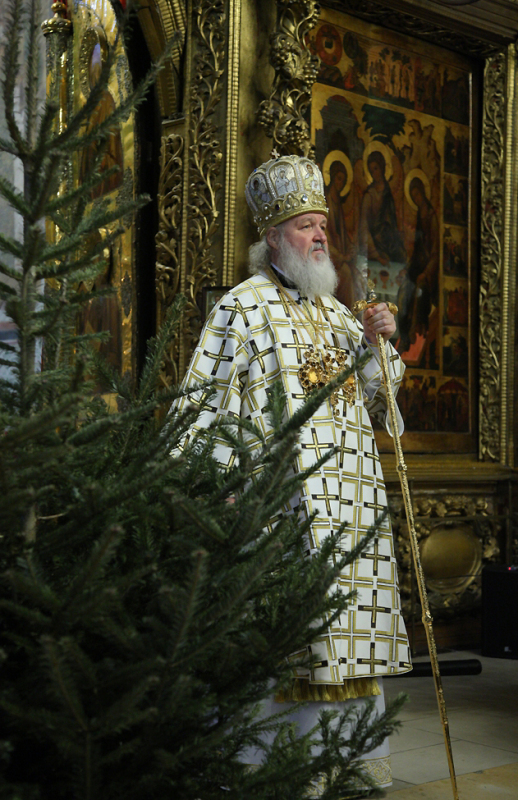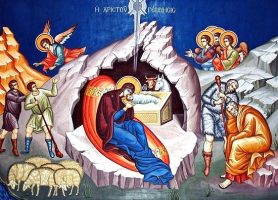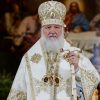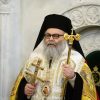And when they were departed, behold, the angel of the Lord appeareth to Joseph in a dream, saying, Arise, and take the young child and His mother, and flee into Egypt, and be thou there until I bring thee word: For Herod will seek the young child to destroy Him. When he arose, he took the young child and His mother by night, and departed into Egypt: And was there until the death of Herod: that it might be fulfilled which was spoken of the Lord by the prophet, saying, Out of Egypt have I called My Son.
Then Herod, when he saw that he was mocked of the wise men, was exceeding wroth, and sent forth, and slew all the children that were in Bethlehem, and in all the coasts thereof, from two years old and under, according to the time when he had diligently enquired of the wise men. Then was fulfilled that which was spoken by Jeremy the prophet, saying, In Rama was there a voice heard, lamentation, and weeping, and great mourning, Rachel weeping for her children, and would not be comforted, because they are not.
But when Herod was dead, behold, an angel of the Lord appeareth in a dream to Joseph in Egypt, Saying, Arise, and take the young child and His mother, and go into the land of Israel: for they are dead which sought the young child’s life. And he arose, and took the young child and His mother, and came into the land of Israel. But when he heard that Archelaus did reign in Judea in the room of his father Herod, he was afraid to go thither: notwithstanding, being warned of God in a dream, he turned aside into the parts of Galilee: And he came and dwelt in a city called Nazareth: that it might be fulfilled which was spoken by the prophets, He shall be called a Nazarene (Matthew 2:12-23).
 In the Name of the Father, and of the Son, and of the Holy Spirit!
In the Name of the Father, and of the Son, and of the Holy Spirit!
In the language of the Church’s Typikon, today is called the Sunday after the Nativity of Christ. This first Sunday after the Savior’s Nativity is dedicated to the memory of the tragic event that took place soon after the Savior’s coming into the world. From the Gospel according to Matthew, we know that King Herod, having been frightened by the news of the Child’s birth brought to him by the eastern wise men or Magi, decided to kill all the male children under the age of two in Bethlehem. The innocents were killed, but the newly born Savior was not among them, since an Angel of the Lord had appeared to Joseph in his sleep, warning him to take the Child and Mary and flee into Egypt. As is well known, the Holy Family stayed in Egypt until the death of Herod, only then returning to Palestine (cf. Matthew 2).
How amazing this is! At His birth, the Angels of God proclaim the glad tidings to the shepherds and, through them, to the entire world of God’s glory: and on earth peace, good will toward men (Luke 2:14). That is, that people have found favor in God’s sight and have been granted peace through the birth of the Son of God. And it is right then, in reply to these glad tidings, that the slaughter of the innocents takes place, so that the tidings that should be spoken to the world by Christ would not be heard. Suffering and grief – this is what was faced by the Savior’s family, by His Most Pure Mother and Joseph the Betrothed. Of course, the Lord Himself, then a child, suffered the hardships of this long journey into Egypt.
The appearance of the angels, the adoration of the Magi, the appearance of the stars – it would seem that the human race, which had been awaiting the Savior, should have seen the coming of the Son of God in these signs and worshipped Him, just as the wise men from the East had, by accepting the Savior and then, having heard His word, by following Him. But nothing like this happened: the world that lay in wickedness continued to lie in wickedness (cf. 1 John 5:19). And we know that it was not only the Savior’s first years that were troubled by persecution, but the entire rest of His life as well – especially when He began His public ministry, when He began to proclaim that which He needed to say. The Savior was met with a wave of anger and envy, and we know that He completed His life martyrically. He rose by Divine power – but this was not from man, but rather from God; for their part, people did everything they could to kill their Savior.
Today we, too, are confronted with manifestations of atheism, often with militant atheism; the most widespread effort to prevent people from absorbing the tidings brought by the God-Man come down to saying: “Yes, there was indeed this person called Jesus, who taught the same things that many others taught. He didn’t say anything special; others said similar things then, and some even do so now.” Therefore, they say, what the Savior said is just one more point of view, one more kind of human wisdom alongside many others, from which we can choose whatever we happen to like.
Our evil generation, supposedly appealing to human freedom and proposing that man be free, simultaneously proposes to him – under the guise of this freedom – that he reject Divine truth. How, in fact, do we know that this truth is unique? Why are we certain that this is not human sophistry? The Apostle Paul, in his Epistle to the Galatians, responds to this very question today. He says: “The Gospel that I preached to you is not from men: I received and was taught it not from man, but through the revelation of Jesus Christ” (cf. Galatians 1:11-12). Paul became a Christian after the Savior’s death and Resurrection; therefore the source of his knowledge was no ordinary source, but a true revelation from on high. While on his way to Damascus to persecute God’s Church he saw the Risen Christ, accepted His word, and turned from a persecutor into an apostle whose words set ablaze people’s hearts and minds and who followed his Teacher’s path, completing his life in martyrdom.
The Apostle Paul is an extraordinarily strong and poignant witness to the fact that the word of Jesus Christ is not a human word, but rather Divine revelation; and therefore to anyone who today tries to mix this Divine word with human sophistry, and thereby to raise doubts about the holiness and immutability of this word, we can say along with the Apostle that we have received and learned this word not from man, but through the revelation of Jesus Christ. Indeed, is our source of knowledge about the Savior not Divine revelation? Someone might say: “No, these are texts that were written in antiquity; you read and acquire knowledge from them, but they’re not in any way different from other texts, whether Egyptian, Babylonian, or Indian.” We can reply to anyone who casts doubt on the uniqueness of the Savior’s words from the experience of the life of the Church, including the life of our own Church.
We, like no one else, have come up against forces that made it their goal completely to eradicate the word of God from people’s hearts and minds. An enormous amount of human strength was thrown into the eradication of this word – such force as had never before been seen in the history of the human race. No pagan empire opposed the Savor’s word with as much force as that which was at work in our country; our martyrs, who remained faithful to this word, exceeded all other martyrs in number. Perhaps the clearest and strongest witness of the fact that we have been taught through the revelation of Jesus Christ is that even this human force was powerless before the word of God. The ancient texts with which the word of God is sometimes compared have practically disappeared. All the pagan wisdom of the great nations and powerful empires has vanished, remaining only in old textbooks and no longer of any concern to anyone. But the word spoken by Him Who was born in Bethlehem is not only of concern to people, but it changes human life. The power of this word comes from the fact that its source is God.
There is one more power that makes this word invincible. Everything that our Lord Jesus Christ said easily falls into our hearts, because it wholly corresponds to man’s inward disposition. For God, in accordance with the Divine truth proclaimed by the Savior, created man in order to place in his nature that moral order, that predisposition for accepting the truth, which responds with the agreement of our mind and heart when we hear this word.
There is something even more important. In order to become convinced of the Divine power of the Savior’s word, one needs to try to live in accordance with it. Then we will begin to acquire an inner spiritual experience of such acute strength that it can overcome any human power. Sometimes people think that it is very difficult to follow Christ, that it is very difficult to listen to and fulfill His word – but it is only seemingly difficult. For My yoke is easy, and My burden is light (Matthew 11:30). If we accept the tidings brought by the Savior, if we take His evangelic word into our hearts, then we will find that His yoke is light and salvific, and we will begin to live according to God’s plan and to live as God has commanded us. Then, in the joy of this existence, of this heavenly existence, all of our sorrows, weaknesses, and sins will disappear and we will acquire the ability to extend this inner paradisiacal peace into eternity, so as there to abide in communion with God. If we respond to the word of God, which is neither the word of man nor an expression of human knowledge, but rather of Divine revelation, then we will open not only the path leading to eternal life with God, but we will find the ability to have God’s Kingdom in our hearts even within the confines of this earthly life.
May the joyful experience of Christ’s Nativity help us all to be strengthened in faith and in the joyful pursuit of all that God has granted the human race in Christ! Amen.
Delivered by His Holiness during the Divine Liturgy in the Dormition Cathedral of the Trinity-Sergius Lavra on January 10, 2010.
Translated from the Russian



















